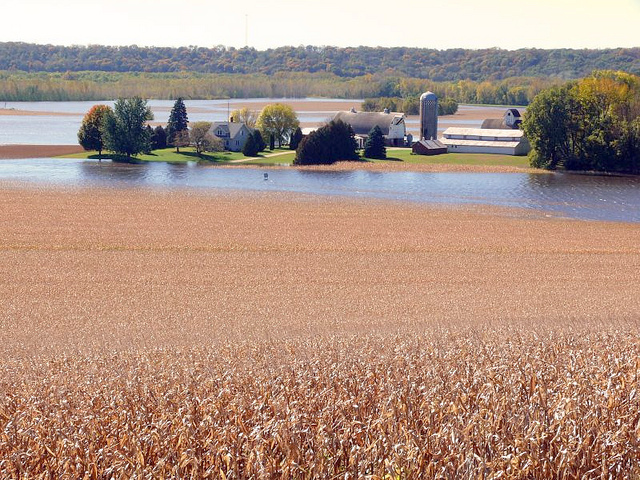Agriculture is one of the major causes of climate change. Soil erosion, methane from livestock, and exhaust from tractors are major sources of greenhouse gases. Last week, Governor Cuomo announced a $1.4 million grant program to help farmers in New York reduce their greenhouse emissions. Farmers can apply for projects to help them better manage water, soil, and waste.
Allison Chatrchyan, director of the Institute for Climate Change and Agriculture at Cornell University, said programs like these are critical to help farmers conerve more energy through by installing solar panels or anaerobic digesters. She said, “It’s really important for farmers to play a role, as everyone should be, to reduce their carbon footprint.”
Farmers in New York are also already reacting to the effects of climate change. According to Chatrchyan, the number of heavy precipitation events is up almost 75 percent in the Northeast and most farmers are conscious of the changes, but need help adapting. “They realize that there’s more extreme rainfall and they realize that there can be more heat stress days and high temperatures, but they need to know what to do about it,” Chatrchyan said. The institute has set up a website to help farmers adapt.
Allison Chatrchyan: If a farmer has just planted their seed—I talked to a farmer in Central New York who actually had just planted seed—it was very difficult for them to get into the field because it was so wet all spring. When they finally got into the field and planted seed, they got a very, very heavy rainfall; I think it was four to five inches in 24 hours, and all their seed washed off. They lost probably more than $50,000. So there are huge economic impacts.
David Sommerstein: And it’s sometimes harder to get in the fields to plough sometimes early in the spring. I’ve talked with dairy farmers whose fields have just been far wet for far too long before they can even get those fields plowed.
AC: Right.
DS: Now what are you doing in talking with these farmers to help them start to adapt to some of these changes.
AC: What we’ve heard from farmers is that they need more specific information about what they can do to adapt. They realize there is more extreme rainfall and they realize there can be more heat stress days, and high temperatures, but they need to know what to do about it.
So, we are working with Cornell researchers to take the data that we have from applied research and develop models, and then develop these online decision support tools. So for example, we are now in the process of developing a growing degree-day tool that will show three things. It will show: where you are in the current growing degree-day, season this year, how does that compare to the last few seasons or the weather over the last 100 years, and then give you the projections for climate change. In the next 20, 30, 50 years, how is that going to change? So a farmer can make some decisions right now about this season, and also compare to how it’s changing over the last couple seasons. And then start thinking about long-term decisions. That’s just one of the tools. We are also developing a frost risk tool that will be really important for fruit growers.
DS: Let me ask you a question about the other side of this issue. Agriculture is one of the large sources of carbon emissions and therefore a cause of climate change. What kinds of things are farmers doing, or are you helping farmers to do to mitigate that?
AC: That’s a really great point. Our cooperative extension offices can provide information to farmers about grants that are available or conducting energy audit, thinking about energy conservation on their farm, or applying for grants to put in solar panels or anaerobic digesters on their farm. So, it is really important for farmers to play a role, as everyone should be, to reduce their carbon footprint
DS: We you talk with farmers about these changes, do they recognize it as climate change, or are there some who push back against that idea?
AC: We found that 82 percent of New York State residents believe the climate is changing. There hasn’t been a similar survey yet of farmers, but we’re hoping to conduct it in New York. In general, nationally, we’ve also found that a vast majority of farmers believe that climate is changing. And so maybe the misconception is that farmers are skeptical about climate change. Many of them may be still, maybe, but they do know that the weather is getting more extreme and we know that is caused by climate change, and many are already doing things to adapt.

